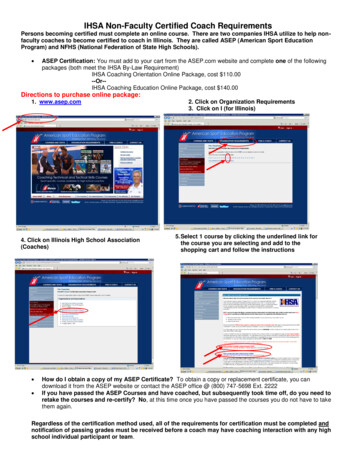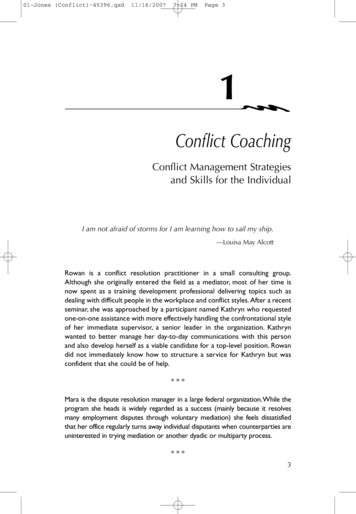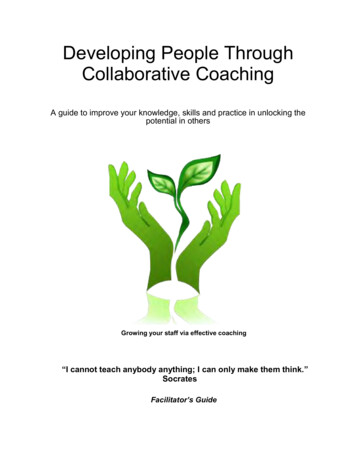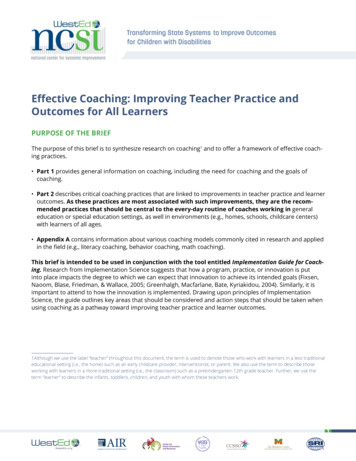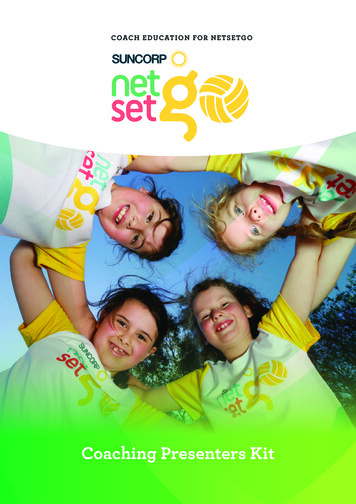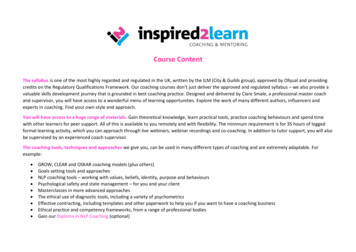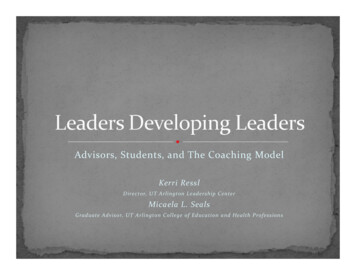
Transcription
Advisors, Students, and The Coaching ModelKerri ResslDirector, UT Arlington Leadership CenterMicaela L. SealsGraduate Advisor, UT Arlington College of Education and Health Professions
To explain the importance of leadership education for beginning and continuing students.To acknowledge the correlation between the co-curricularexperience and student retention and success.To discuss methods of developing collaborative relationshipsbetween academic and student affairs to ensure co-curricularexperience.To emphasize the importance of mentoring relationships andpresent a structure approach to establishing those relationshipsthrough student affairs initiatives.To provide a brief overview of the mission and goals of TheLeadership Center at UT Arlington and discuss opportunities toget involved and/or implement initiatives on other campuses.
Identify a student you advise that you think has greatpotential for success in college and beyond.
Transferable skills Skills acquired in a previous job, activity, or experience that isapplicable to a number of job functions and future careerchoices. Competitive candidate in job market Skills associated with leadership education compile the list oftop skills sought by employers. Impact on commitment and retention Students seek external opportunities for development andengagement. When students see these experiences asvaluable, they commit to the institution. Development of well-rounded individuals The goal of higher education is to develop students in allareas (i.e. academically, emotionally, professionally,personally, ethically, etc.).
Write down three of the student’s strongest assets/skills.List three skills that you believe the student needs todevelop.
Verbal and written communication skills Honesty and integrity Interpersonal skills Teamwork skills Strong work ethic Motivation and initiative Flexibility and adaptability Computer skills Analytical skills Organizational skillsSource: Manpower
Transformative Leadership Inspire commitment in their followers. Produce outcomes that exceed expectations. Empowerment motivating people to change, while giving them a sense ofownership and self-actualization. Relational Leadership Relationships are the key to leadership effectiveness. People work together toward a common purpose to make andimpact or achieve change that benefits an organization orcommunity (i.e. Social Change Model) Situational Leadership There is no single “best” leadership model or style. Leadership styles must be task-relevant and leaders must bemature enough to adapt the leadership style to the situationat hand.
Do you view your position as an opportunity or anobligation?
5 Levels of Advising LeadersLeadership CoachYou have developed leaders who, in turn, develop others.MentorStudents seek to develop skills by shadowing you.Role ModelYour track record has made you credible to students.ConsultantStudents trust your opinions and follow.AdvisorLeader by title only.
Leaders should develop leaders who will ultimately developother leaders. It should be a continuous cycle.
What factors are preventing you from developing coachingrelationships with your students?
essentially a blueprint for the architecture that willbuild the monument of your leadership legacy.Food for Thought - Jim Kouzes’ Ten Leadership Lessons Leadership is everyone’s business.Credibility is the foundation.Personal values drive commitment.You either lead by example, or you don’t lead at all.Looking forward is a leadership prerequisite.It’s not just the leader’s vision.Challenge provides the opportunity for greatness.Leaders are team players.Leadership is a relationship.Caring is at the heart of leadership.
Have you taken advantage of internal and/or externalresources to learn how to engage students in a mentoring orcoaching relationship?
Division of Student Affairs Leadership Programs and Retreats Departmental of Personal Leadership Training Campus Involvement Leadership Coach Student Mentoring Community Service Project Volunteer Visibility at Non-Academic Event and Lectures Participation in University and External Associations
Contact your Student Affairs/Student Services department for opportunities to get involved.Mind Tools: http://www.mindtools.comJohn Maxwell on 5 Leadership: http://www.g5leadership.comUT Arlington Leadership Center: http://www.uta.edu/leadershipUniversity of lunteer/coach.aspInternational Mentoring Association: http://mentoring-association.org
“The first follower transforms the lone nut into a leader.”
What are your next action steps for making an impacton the student you defined for this activity?
Now, go out there and lead! Remember it only takes one!
Relationships are the key to leadership effectiveness. People work together toward a common purpose to make and impact or achieve change that benefits an organization or community (i.e. Social Change Model) Situational Leadership There is no single "best" leadership model or style. Leadership styles must be task-relevant and leaders must be




